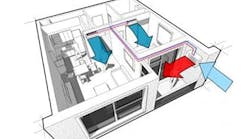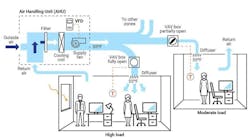by Steve Gillespie
What is an IAQ survey? Simply put, it involves checking the IAQ aspects in a building, including the HVAC system, and then reporting the findings to the owner.
Chances are, you're already performing or should be performing most or all of the required tasks during service calls. However, I'm going to show you how and why a survey should be a mandatory part of all sales and maintenance calls, and how it can boost your bottom line.
Why Do IAQ Surveys
Here are just a few reasons why performing indoor air quality surveys is a good idea:
- We're in the business of helping customers. A survey helps discover energy inefficiencies in the building envelope. It also provides an opportunity to improve the health of occupants.
Never assume that customers don't want to improve their health by using improved equipment or accessories. Tell them about all of their available options, and let them make the decision.
In addition, there's comfort. Whether it's an issue with humidity or temperature control, we can help. Finally, quantifying IAQ parameters with test instruments increases customer peace of mind by assuring them that their environment is a safe one.
- Who wants better IAQ? Everyone! More than 50 million Americans suffer from allergy-related diseases, such as asthma. Factors such as temperature, humidity, airborne particles, and volatile organic compounds all have an impact in homes and commercial buildings.
- It minimizes liability. The link between mold problems, liability, and litigation is real, even if you aren't the installing contractor. A survey identifies potential problems and quantifies IAQ improvement that you provide.
- It protects employees. With the shortage of employees out there, you certainly don't want them to get sick.
- IAQ surveys set you apart from the competition. Advertise that your technicians perform IAQ surveys on all calls. Chances are your competition doesn't offer the same service, so you become the expert in town.
- There's an opportunity for increased profit during sales calls. Performing an IAQ survey during a sales call is an excellent opportunity to discuss high-efficiency equipment and accessories with customers. Not only can you improve their health and comfort, but this equipment commands a higher profit margin than standard systems.
- There's an opportunity for increased profit during sales calls. Service-calls are a great time to educate customers on how we can improve their IAQ, as well as increase comfort and energy through quality products such high-efficiency air cleaners, HEPA, humidifiers, ultraviolet lighting and services such as duct sealing.
It's also a profit booster. For example, an average service call might total $180. At 10% net profit, that's only $18 profit. However, an IAQ survey could lead to a $400 duct sealing job, which brings in $200 or 50% in profit, which is $200.
Finally surveys also lead to happier technicians. First, you're not rushing them all over town trying to run too many calls in a day. Second, if you have them on an incentive plan, high-margin IAQ equipment sales will benefit their pocketbooks, as well.
The Survey
Having a questionnaire ensures that your technicians or sales staff perform each and every necessary step for the IAQ survey. With a copy for both the customer and the office, it also quantifies the work you've performed.
Before looking at the equipment, ask customers:
- Do you or anyone in your home suffer from allergies?
- Do you have any pets?
- Do you have a problem with dust?
- Is the environment too dry or humid?
- Are you experiencing high utility bills? (What does this have to do with poor IAQ? If the return air ductwork is leaking, it could be pulling in nasty air from outside and overworking the equipment.)
When checking the equipment, be sure to:
- Check static pressure. Look for restriction in airflow in ducts, which could indicate a clogged coil, a dirty filter, or poorly sized ductwork. Customers also tend to block vents with furniture. If there's low static pressure, there could be ductwork that's disconnected or sized too large, as well as a dirty blower motor.
- Check air velocity. If we move the air too quickly, it's uncomfortable and we can't filter it as well. If there are UV lights in the system, they won't help much if the air is moving past them at too high of a velocity.
- Check duct integrity. Leaks can bring dirty outside air and flue gas back into a building.
- Check filter efficiency. What type of filter is it? Is it too restrictive? The best filter to use has low restriction, is high capacity, and is easy to install.
- Check indoor particle levels by using handheld particle counters and also check VOC levels. To combat VOCs, advise customers to keep chemicals outside, recommend carbon filters, and install exhaust fans in attached garages.
Recommendations
Once the survey is complete, here are some products and services to recommendto your customers:
- High quality air filters
- Variable speed systems
- UV lights
- HEPA bypass filters
- Duct sealing
- Duct modifications
- Ventilation
- Humidification
When presented a variety of IAQ improvement solutions, customers rarely choose to have everything done at once. Offer solutions in stages. This way, you'll always have a backlog of nonemergency, IAQ-related work. If you run your business this way, there's no reason why you should ever be "slow," regardless of the weather outside. Most of all, continue your IAQ education.
Steve Gillespie is a fourth generationHVAC contractor with 31 years of experience. For more information, visit www.4youradvantage.com








